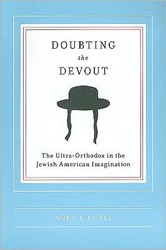In her last posts, Nora Rubel wrote about keeping kosher and “keeping Jewish”and Jewsteria Lane. She has been blogging all week for MyJewishLearning and the Jewish Book Council.
I love television, I love movies, and I read too (when I can squeeze in time between my regularly scheduled programming). I have always been interested in how popular culture attempts to warn us about the dangerous influences of our time. Such literary and cinematic narratives warn us about the consequences of certain behaviors. Sometimes they warn us about the influence of alcohol or drugs as in the 1980s’ after school specials Angel Dusted and Desperate Lives (both of which feature Helen Hunt). Sometimes, we can learn to fear the influence of certain types of people and religious beliefs (think about Iranians and Islam in the 1991 film Not Without My Daughter). If we examine the context of such films however, we can see that they tell us more about ourselves and our times than they do of the chosen subject matter.
When I was in college, my mother gave me the Naomi Ragen novel Sotah. While I ravenously devoured it, enjoying the sneak peek into the hidden world of ultra-Orthodox (haredi) Jews, I imagine that I (embarrassingly uncritically) swallowed the content as completely true.

Nora Rubel
One such famous (and false) tale is the 1836 bestselling exposé Awful Disclosures of Maria Monk, or, The Hidden Secrets of a Nun’s Life in a Convent Exposed, which told of unspeakable horrors that took place in a Montreal convent: the sexual solicitation of nuns by priests, infanticide, and murder. Read by many at a time when convents were actually being burned down by angry mobs, these convent tales fueled already existing nativist passions. A ghostwritten work, its purpose was to warn Protestant women of the dangers of the Catholic Church.
After I read this piece, my thoughts turned back to Sotah, a novel that (likeAwful Disclosures) highlighted anxiety about the nature of power and authority, primarily the power wielded over women. I thought of my response to the novel, particularly my feelings of certainty that the haredi world was a dangerous place for women, and wondered if perhaps I was being manipulated as a reader. I began seeking out fictional narratives that featured ultra-Orthodox characters and found that for many this theme of Ragen’s was common. Sometimes the agenda was in favor of a more moderate religiosity, sometimes it favored a progressive secularism. In all cases, the texts seemed to function as weapons in an ongoing culture war, one that is an argument over authentic Judaism.
The texts pursued in my new book, Doubting the Devout: the Ultra-Orthodox in the Jewish American Imagination, emerge therefore in a period of cultural contestation, a moment when the dominant group, mainstream American Jewry, consciously or unconsciously believes it is being threatened by an invasion of the marginalized group, the ultra-Orthodox. As in the earlier anti-Catholic and anti-Muslim narratives, the dominant culture constructs extreme portraits of the marginalized group as an articulation of its own cultural insecurity and anxiety. The anti-haredi writings that I profile in this book place this American Jewish culture war in a long line of American ethnic and religious conflict. The narratives replace the lecherous priests in anti-Catholic tales with manipulative rabbis, the abusive convent with the repressive yeshiva, but the formula remains the same: these people are different and threatening, and the public should be warned.
Nora Rubel is the author of the recently published Doubting the Devout: The Ultra-Orthodox in the Jewish American Imagination. She has been blogging here all week.
Not Kosher
Jewsteria Lane
Based on a “True” Story


